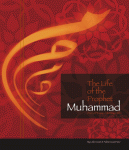The Life Of The Prophet Muhammad

The Orphan's Childhood
Muhammad (pbuh) returned to live with his mother in Mecca when he was about three years old. Three years later Aminah decided to take her son to visit his uncles in Yathrib. She told her maid, Barakah, to prepare everything they would need for the long journey, and then they joined one of the caravans going there. They stayed in Yathrib a month and Muhammad (pbuh) enjoyed the visit with his cousins. The climate there was very pleasant and he learned to swim and to fly a kite. On their way back to Mecca, however, Aminah became ill and died. She was buried in the village at al-Abwa not far from Yathrib. Muhammad (pbuh) returned sadly to Mecca with his mother's maid He was now six years old and had lost both his father and mother. He was then adopted by his grandfather, ‘Abd al-Muttalib, who loved him dearly and kept him by his side at all times.
It was the custom of 'Abd al-Muttalib to sit on a blanket near the Ka’bah. There he was always surrounded by people who had come to speak to him. No one was allowed to sit on the blanket with him, however, except his grandson Muhammad (pbuh), which shows how close they were to each other. Many times 'Abd al-Muttalib was heard to say: 'This boy will be very important one day.'
Two years later 'Abd al-Muttalib became ill and Muhammad (pbuh) stayed by him constantly. 'Abd al-Muttalib told his son, Abu Talib, to adopt Muhammad (pbuh) after his death, which he did. Abu Talib had many children of his own, but Muhammad (pbuh) immediately became part of his family and the favorite child. The time came for Quraysh to prepare a caravan to go to Syria. Abu Talib was going with them and he took Muhammad (pbuh) along. It was Mohammed’s first journey to the north. After days of travel, the caravan arrived at a place near Syria where the Romans used to come to trade with the Arabs. Near this marketplace lived a monk called Bahira’. His cell had been used by generations of monks before him and contained ancient manuscripts. Bahira' saw the caravan in the distance and was amazed to see that over it was a large white cloud. It was the only cloud in a clear blue sky and it appeared to be shading one of the travelers. The monk was even more surprised to see that the cloud seemed to follow the caravan but disappeared when the person it was shading sat down under a tree. Bahira’ knew from the scriptures that a prophet was expected to come after Jesus and it had been his wish to see this prophet before he died. Realizing that what he had just seen was a miracle, he began to think that his wish might, after all, come true.
The monk sent an invitation to the Meccans to come and eat with him. The Arabs were surprised because they often passed by and Bahira’ had never invited them before. When the group was all together for the meal, the monk said, 'Is this everyone?’ 'No', someone said, 'a boy was left watching the camels.' Bahira’ insisted that the boy should join them. The boy was Muhammad (pbuh). When he arrived Bahira’ said nothing, but watched him all through the meal. He noticed many things about his appearance which fitted the description in the old manuscripts. Later on he took him aside and asked Muhammad (pbuh) many questions. He soon found out how he felt about the idols in the Ka'bah. When Bahira tried to make him swear by them, as the Arabs used to do, Muhammad (pbuh) said, 'There is nothing in this world that I hate more'. They talked together about Allah and about Mohammed’s life and family. What was said made Bahira certain that this was indeed the Prophet who would follow Jesus.
Then the monk went to Abu Talib and asked him how he was related to Muhammad (pbuh). Abu Talib told him that Muhammad (pbuh) was his son. Bahira replied that this could not be so because the boy was destined to grow up an orphan, and he ordered Abu Talib to watch over Muhammad (pbuh) with great care. There are many stories told about Mohammed’s youth. Some tell of how he used to take the family's sheep to graze and was always kind to them. While they grazed he would sit thinking about the mysteries of nature. Unlike those around him1 he never worshipped the idols and never swore by them. He also wondered why people were always struggling for power and money, and this saddened him and made him feel lonely, but he kept his feelings to himself. He was a quiet, thoughtful boy, and rarely played with other boys of his age. On one occasion, however, Muhammad (pbuh) went with some of the boys to a wedding in Mecca. When he reached the house he heard the sounds of music and dancing but just as he was about to enter he suddenly felt tired and, sitting down, fell asleep. He didn't wake up until late the next morning and thus missed the celebrations. In this way Allah prevented him from doing anything foolish for He was keeping Muhammad (pbuh) for something much more important.
